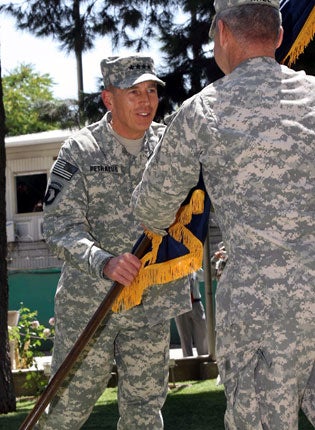Petraeus takes command in Afghanistan and tells troops, 'We are in this to win'
General hints at resumption of airstrikes to keep down casualties after bloody month

General David Petraeus took formal command of 130,000 US and NATO troops in Afghanistan yesterday, declaring in Kabul that the critical moment in the nine-year war had come and "We are in this to win".
He said he intended to pursue the same strategy of protecting Afghan civilians as his predecessor, General Stanley McChrystal, who was sacked last month for making critical remarks about senior American officials including President Barack Obama.
General Petraeus did hint that he would review stringent rules prohibiting the use of heavy weapons in action to avoid civilian casualties. In a memo to troops he said that "protecting those we are here to help nonetheless does require killing, capturing or turning the insurgents. We will not shrink from that".
He also noted that the international forces had suffered 102 dead, more than half Americans, in fighting in June. This is the heaviest monthly loss since October 2001 when US-backed forces overthrew the Taliban. US soldiers had criticised General McChrystal for increasing their losses by curtailing their use of heavy weapons and airpower.
General Petraeus told troops: "As you and our Afghan partners on the ground get into tough situations, we must employ all assets to ensure your safety, keeping in mind, again, the importance of avoiding civilian casualties."
Afghan critics and foreign experts on the country agree with General Petraeus that the war has reached a critical phase. "All sides are tired and nobody feels they are winning the war," said one international diplomat in Kabul, discounting reports that the Taliban believed they can wait until US forces start to withdraw in 2011 as promised by President Obama.
"Each side wants to feel stronger before talking," said the diplomat, adding that this was the purpose of the American "surge" and the Taliban "counter-surge". He pointed out that the insurgency might be popular among Afghans but the Taliban was not. The Taliban has said it is more interested in talking with "foreign occupiers" about their withdrawal and the release of detainees than it is in talking to the government of Afghan President Hamid Karzai, which it dismisses as pawns.
The weakest point of the Taliban is that they remain highly reliant on safe enclaves in Pakistan, say interlocutors who have spoken to them. One intermediary said: "The Taliban are not sure that they have a 'no objection certificate' when they are in Pakistan."
Pakistan has recently shown greater interest in becoming involved in negotiations to end the war in Afghanistan, with the army chief, General Ashfaq Kayani visiting Kabul last week.
Serious or not, rumours of talks and approaches to the Taliban are beginning to demoralise and divide the political elite in Kabul, many of whom come from the anti-Taliban Northern Alliance that captured Kabul with US assistance in 2001. Northern Alliance leaders are mostly Tajiks, Uzbeks and Hazara who fear that talks with the Taliban might restore the Pashtun community to power.
Glib talk of negotiating with the Taliban without deciding beforehand what bargaining chips are on the table is a mistake, said the head of the Afghan Red Crescent society, Fatima Gilani. "Are we going to give up women's rights which have so improved since 2001?" she asked, adding that it would have been much better to talk to the Taliban when they were still weak.
As head of the Red Crescent, which has 41,000 volunteers across Afghanistan, Ms Gilani is in a good position to judge the opinion of ordinary people. She said: "Villagers are angry with the government and everybody in authority, Afghan or foreign, for doing nothing for them. You cannot imagine their poverty. I have been in villages where there is no drinking water and people have not washed for years. They have become indifferent to appeals to their loyalty."
The presence of the Red Crescent is accepted by the Taliban because its doctors treat Taliban wounded and return dead bodies to their families.
Ms Gilani's account of overwhelming poverty unaffected by foreign aid is confirmed by government statistics. The National Risks and Vulnerabilty Assessment shows that nine million out 23 million Afghans live in total poverty and a further five million barely survive on less than $2 a day. Some oligarchs and warlords have battened on foreign aid and supply contracts with the US and Nato to make fortunes.
The majority of Afghans view the state as a parasitic burden on themselves rather than as a provider of services. Last year, Afghans paid $2.5bn in bribes, says the UN Office on Drugs and Crime (Undoc). The Undoc executive director, Antonio Maria Costa, said: "Drugs and bribes are the two largest income generators in Afghanistan: together they correspond to about half the country's GDP."
An Undoc survey showed that 59 per cent of Afghans viewed public dishonesty as their biggest concern, 54 per cent cited insecurity and 52 per cent unemployment. The average bribe is $160 in a country where the average annual wage is $425.
The counter-insurgency strategy devised by General Petraeus and implemented by General McChrystal has been to install central government authority across Afghanistan.
But the survey shows that police and local officials are most frequent takers of bribes followed by judges, prosecutors and members of the government. Most Afghans say they believe international organisations and NGOs "are corrupt and in the country to make money".
Join our commenting forum
Join thought-provoking conversations, follow other Independent readers and see their replies
Comments
Bookmark popover
Removed from bookmarks